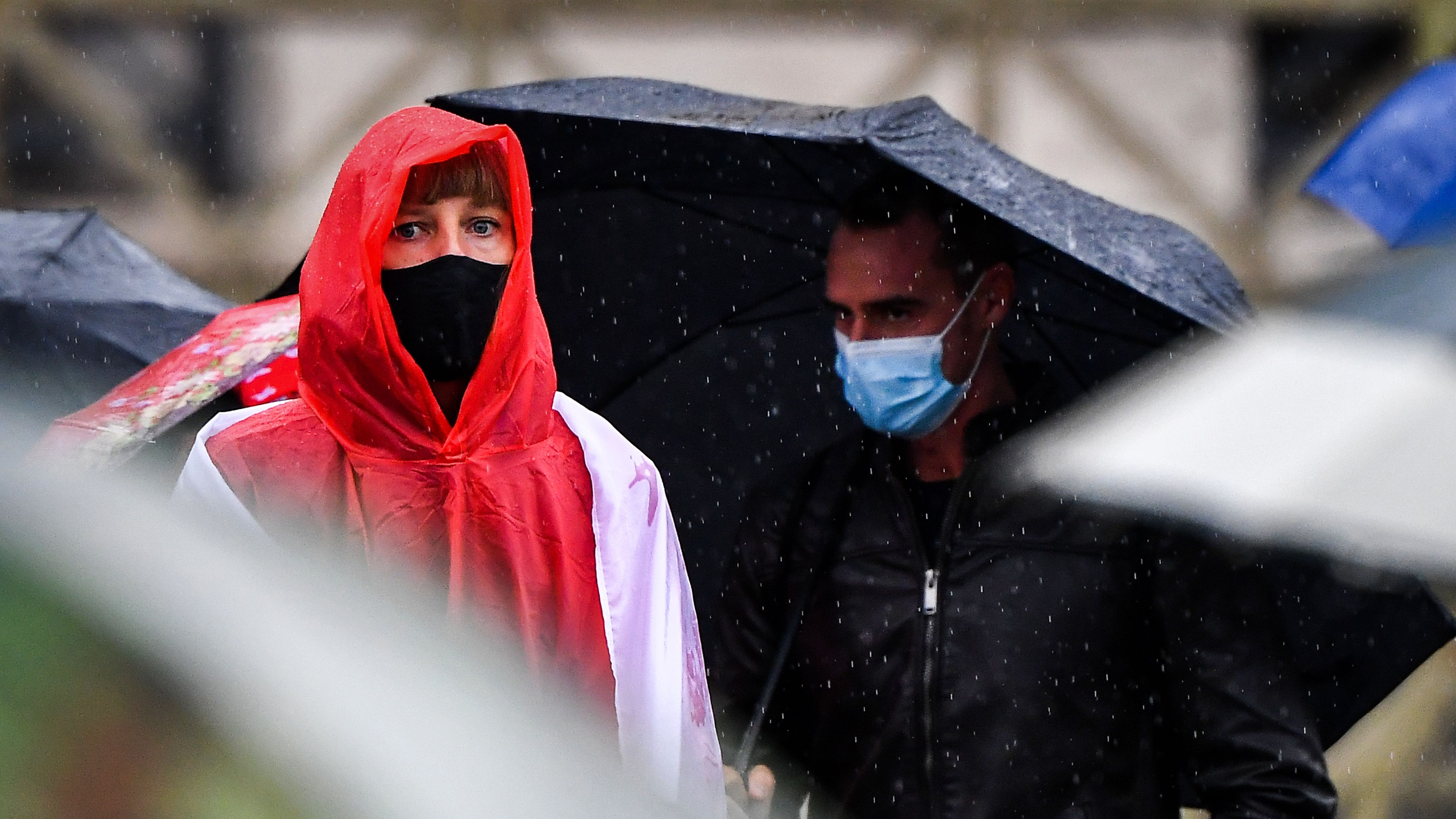Face masks may not protect against coronavirus in rain, say WHO and PHE
Health authorities say coverings must be changed more regularly in wet and damp weather

A free daily email with the biggest news stories of the day – and the best features from TheWeek.com
You are now subscribed
Your newsletter sign-up was successful
Face masks are less effective in preventing the spread of coronavirus when worn in rain, according to Public Health England (PHE) and the World Health Organization (WHO).
Following heavy downpours across much of the UK, and with winter just around the corner, the health authorities are warning that face coverings must be replaced if they became damp - a message that has been echoed by many experts.
Tim Spector, a professor of genetic epidemiology at King’s College London, is calling on Downing Street officials to provide the public with “clear advice” on the issue.
The Week
Escape your echo chamber. Get the facts behind the news, plus analysis from multiple perspectives.

Sign up for The Week's Free Newsletters
From our morning news briefing to a weekly Good News Newsletter, get the best of The Week delivered directly to your inbox.
From our morning news briefing to a weekly Good News Newsletter, get the best of The Week delivered directly to your inbox.
“Masks need to be changed regularly and this is particularly important to understand in damp and wet weather,” he told The Times.
In France, where wearing a face mask outdoors is compulsory in some cities, “local guidelines encourage users to carry a second mask because of the risk”, says the newspaper.
Leading cardiologist Aseem Malhotra has also criticised the UK government for failing to launch a “public campaign to make people aware that [rain] can make their masks ineffective”, adding that “it is obvious that masks will get damp as people shop and travel in bad weather”.
Current guidance from the Department of Health and Social Care advises members of the public to “change the face covering if it becomes damp or if you’ve touched it”.
A free daily email with the biggest news stories of the day – and the best features from TheWeek.com
The WHO advises that face masks should consist of at least three layers of different material, but states that moisture can undermine this protection.
“For any type of mask, appropriate use and disposal are essential to ensure that they are as effective as possible and to avoid any increase in transmission,” the UN health agency says.
“All masks should be changed if wet or visibly soiled. A wet mask should not be worn for an extended period of time. Replace masks as soon as they become damp with a new clean, dry mask.”
The warnings come as Storm Alex continues to wreak havoc in the UK, with flood alerts still in place across much of the country following heavy rain, high winds and power cuts.
Joe Evans is the world news editor at TheWeek.co.uk. He joined the team in 2019 and held roles including deputy news editor and acting news editor before moving into his current position in early 2021. He is a regular panellist on The Week Unwrapped podcast, discussing politics and foreign affairs.
Before joining The Week, he worked as a freelance journalist covering the UK and Ireland for German newspapers and magazines. A series of features on Brexit and the Irish border got him nominated for the Hostwriter Prize in 2019. Prior to settling down in London, he lived and worked in Cambodia, where he ran communications for a non-governmental organisation and worked as a journalist covering Southeast Asia. He has a master’s degree in journalism from City, University of London, and before that studied English Literature at the University of Manchester.
-
 Political cartoons for February 19
Political cartoons for February 19Cartoons Thursday’s political cartoons include a suspicious package, a piece of the cake, and more
-
 The Gallivant: style and charm steps from Camber Sands
The Gallivant: style and charm steps from Camber SandsThe Week Recommends Nestled behind the dunes, this luxury hotel is a great place to hunker down and get cosy
-
 The President’s Cake: ‘sweet tragedy’ about a little girl on a baking mission in Iraq
The President’s Cake: ‘sweet tragedy’ about a little girl on a baking mission in IraqThe Week Recommends Charming debut from Hasan Hadi is filled with ‘vivid characters’
-
 A Nipah virus outbreak in India has brought back Covid-era surveillance
A Nipah virus outbreak in India has brought back Covid-era surveillanceUnder the radar The disease can spread through animals and humans
-
 Covid-19 mRNA vaccines could help fight cancer
Covid-19 mRNA vaccines could help fight cancerUnder the radar They boost the immune system
-
 The new Stratus Covid strain – and why it’s on the rise
The new Stratus Covid strain – and why it’s on the riseThe Explainer ‘No evidence’ new variant is more dangerous or that vaccines won’t work against it, say UK health experts
-
 RFK Jr. vaccine panel advises restricting MMRV shot
RFK Jr. vaccine panel advises restricting MMRV shotSpeed Read The committee voted to restrict access to a childhood vaccine against chickenpox
-
 RFK Jr. scraps Covid shots for pregnant women, kids
RFK Jr. scraps Covid shots for pregnant women, kidsSpeed Read The Health Secretary announced a policy change without informing CDC officials
-
 New FDA chiefs limit Covid-19 shots to elderly, sick
New FDA chiefs limit Covid-19 shots to elderly, sickspeed read The FDA set stricter approval standards for booster shots
-
 RFK Jr.: A new plan for sabotaging vaccines
RFK Jr.: A new plan for sabotaging vaccinesFeature The Health Secretary announced changes to vaccine testing and asks Americans to 'do your own research'
-
 Five years on: How Covid changed everything
Five years on: How Covid changed everythingFeature We seem to have collectively forgotten Covid’s horrors, but they have completely reshaped politics